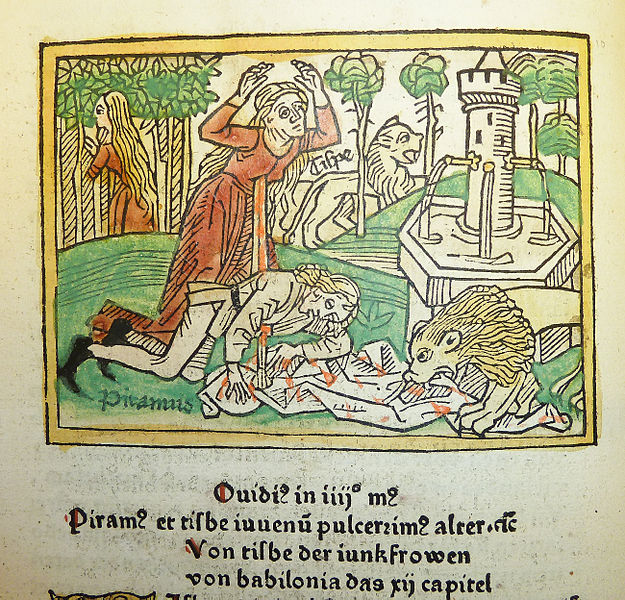Reading Notes: Ovid's Metamorphoses, Part B
Out of the 6 stories that I read today for the Part B
readings of Ovid’s Metamorphoses, Pyramus and Thisbe stuck with me the most. Basically, Shakespeare adapted the Roman version to be his Romeo and Juliet. In this
version, instead of fake poisoning, Pyramus thinks that Thisbe had been eaten
by a lion after discovering her bloodied veil in the place where they were supposed
to meet. This is one of the only stories that I read that didn’t include an
overt god who meddles with the characters in it. In two of the other stories, the
gods are back to their meddling with human lives because of silly reasons. In, “Echo”,
Tiresias is made blind by Juno after disagreeing with her viewpoint that men experience
more pleasure during lovemaking.
A detail that I found fascinating within Pyramus and Thisbe
was how their deaths were described, how, “the blood spurted out, like a pipe
fracturing at a weak spot in the lead…”. This is much more vivid than the previous
stories described death – making it sound that much more tragic that someone
heartbroken would do such a thing to themselves. It gives a good warning to not
act so foolishly or rashly in certain situations – again showing that the
Romans, like so many other civilizations, wanted some of their stories to mean something,
to teach whoever is told certain lessons. Another aspect that I like about these
metamorphoses stories is how they tell why objects/animals are the they are. In
the case of mulberry trees, the fruits are blackish red due to the blood that
seeped into the tree from both Pyramus and Thisbe.
Overall, I think the best thing that I learned from this
part B of reading was how to make death stand out and how to make the reader
sympathize with the characters within a story.
1. Pyramus and Thisbe by David Kline, Ovid's Metamorphoses

Woodcut Illustration of Pyramus and Thesbe
By Heinrich Steinhöwel, 1474

Comments
Post a Comment